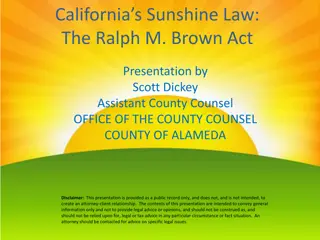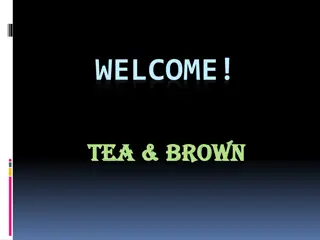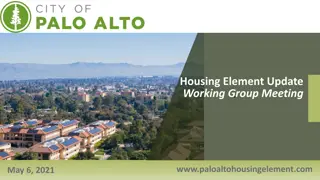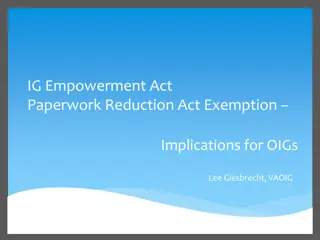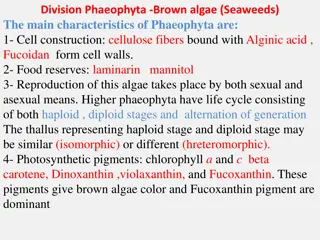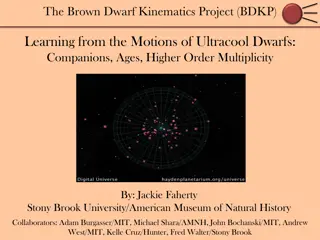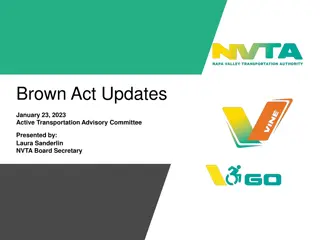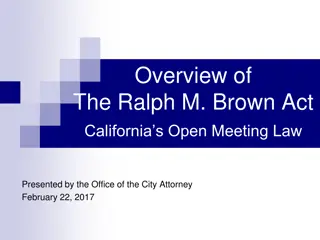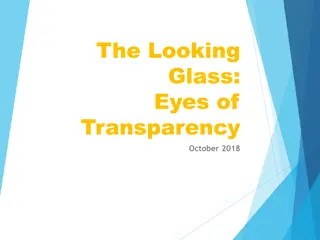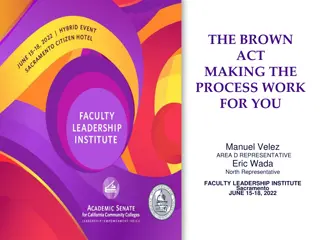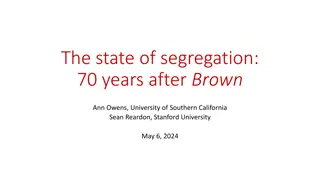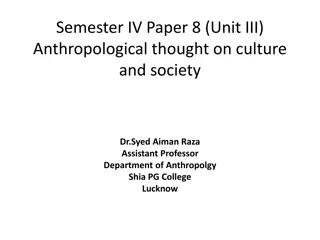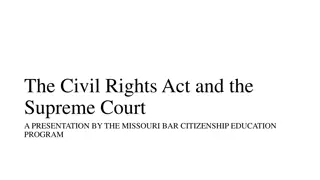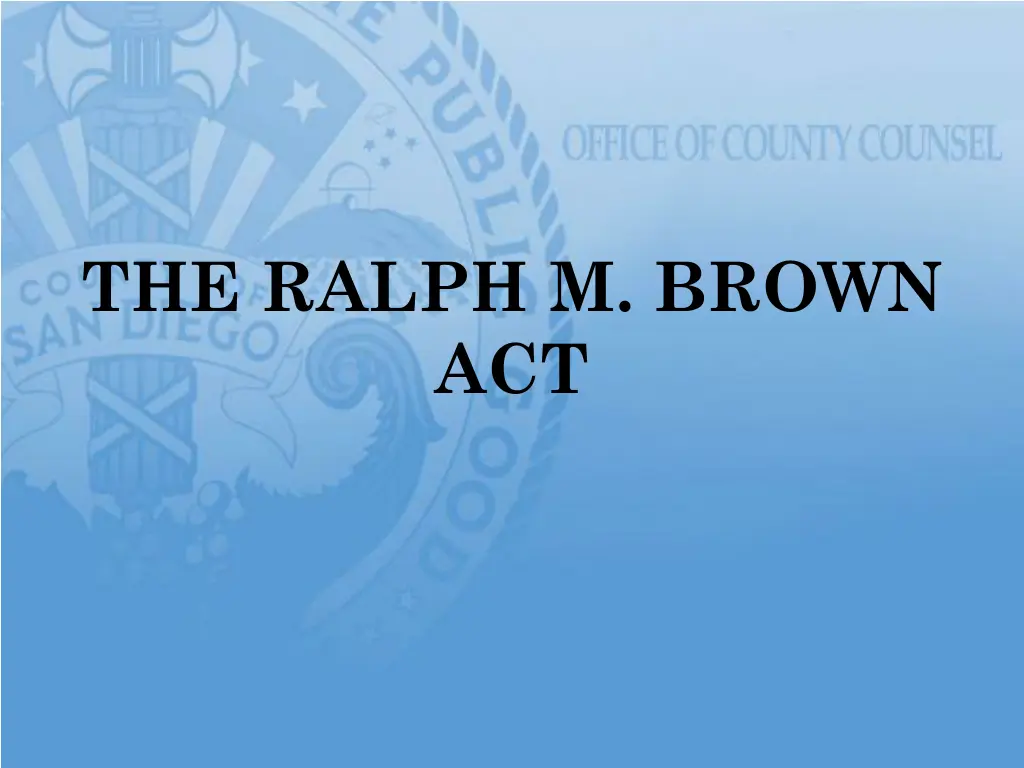
Understanding the Ralph M. Brown Act and Its Implications
The Ralph M. Brown Act, also known as the Brown Act, ensures transparency in government proceedings in California by allowing public access to meetings and documents. This act defines legislative bodies, outlines meeting requirements, and establishes penalties for non-compliance. Learn who is subject to the Brown Act, the types of legislative bodies it applies to, and the importance of open decision-making processes.
Download Presentation

Please find below an Image/Link to download the presentation.
The content on the website is provided AS IS for your information and personal use only. It may not be sold, licensed, or shared on other websites without obtaining consent from the author. If you encounter any issues during the download, it is possible that the publisher has removed the file from their server.
You are allowed to download the files provided on this website for personal or commercial use, subject to the condition that they are used lawfully. All files are the property of their respective owners.
The content on the website is provided AS IS for your information and personal use only. It may not be sold, licensed, or shared on other websites without obtaining consent from the author.
E N D
Presentation Transcript
THE RALPH M. BROWN ACT 1
THE BROWN ACT THE BROWN ACT Government Code Section 54950, et seq. Government Code Section 54950, et seq. In enacting this chapter, the Legislature finds and declares that the public commissions, boards and councils and the other public agencies in this State exist to aid in the conduct of the people's business. It is the intent of the law that their actions be taken openly and that their deliberations be conducted openly. The people of this State do not yield their sovereignty to the agencies which serve them. The people, in delegating authority, do not give their public servants the right to decide what is good for the people to know and what is not good for them to know. The people insist on remaining informed so that they may retain control over the instruments they have created. 2
THE BROWN ACTS PURPOSE THE BROWN ACT S PURPOSE Defines legislative bodies and what constitutes Defines legislative bodies and what constitutes a meeting a meeting Provides for public access to meetings and Provides for public access to meetings and documents documents Agenda requirements Agenda requirements Sets forth closed session items Sets forth closed session items Adopting meeting procedures Adopting meeting procedures No secret ballots No secret ballots record must show who voted record must show who voted on any item in open or closed session if on any item in open or closed session if disclosure is required disclosure is required Establishes remedies and penalties Establishes remedies and penalties 3
WHO IS SUBJECT TO THE BROWN ACT? WHO IS SUBJECT TO THE BROWN ACT? Legislative Bodies Governing body of a local agency Local body created by state or federal statute A commission, board, or other body created by formal action of a legislative body 4
LEGISLATIVE BODY LEGISLATIVE BODY TYPES TYPES Board of Supervisors, City Councils, School Boards Governing Bodies Governing Bodies Advisory Committees, Planning Commission Appointed Bodies Appointed Bodies Standing Standing Committees Committees Permanent Subcommittees Newly elected or appointed members, not yet seated New Members New Members 5
MEETINGS MEETINGS DEFINED DEFINED Broad definition: Broad definition: A congregation of a majority of the members of a legislative body at the same time and place to hear, discuss, or deliberate on items within their subject matter jurisdiction. 6
LEGISLATIVE BODY SUBCOMMITTEES LEGISLATIVE BODY SUBCOMMITTEES The Brown Act also applies to subcommittees: Regular subcommittees of a legislative body are subject to the Brown Act Limited duration Ad Hoc committees for a specific purpose (composed of fewer than a quorum of legislative body members) are not Brown Act Ad Hoc committees that include members of the public are are subject to the Brown Act Any committee created by formal action is also subject to the Brown Act (e.g., ordinance or resolution) are are not subject to the 7
NO NO SERIAL SERIAL MEETINGS MEETINGS Majority of members uses a series of communications of any kind directly or through intermediates to discuss, deliberate, take action or develop collective concurrence outside an authorized meeting 8
SERIAL SERIAL MEETINGS MEETINGS - - METHODS METHODS Discussing/sharing views through a series of: Emails, Text messages Phone conversations Face-to-face conversations Intermediaries or polls Examples: o Reply All o Chain: A contacts B; B contacts C o Hub & Spoke: A contacts B; A contacts C 9
PERMITTED ACTIVITIES OUTSIDE NOTICED PUBLIC PERMITTED ACTIVITIES OUTSIDE NOTICED PUBLIC MEETINGS MEETINGS 1. Individual contacts with non-members 2. Conferences that are open to the public 3. Community meetings of another organization that are open and publicized to address a topic as part of the prepared agenda take no action 4. Other legislative body meetings that are open and publicized to address a topic as part of the prepared agenda take no action 5. Standing subcommittees without participation 6. Social or ceremonial events 7. Grand Jury testimony Do not discuss board/commission/committee issues with a majority of the body or standing subcommittee outside of a noticed public meeting 10
SOCIAL MEDIA SOCIAL MEDIA Members may engage on social media to answer questions, provide or solicit information so long as a majority of body does not discuss among themselves Members may not respond directly to any social media of another member of the same legislative body on a subject matter within the jurisdiction of the shared board (No digital icons/emojis/tweets/sharing) 11
MEETINGS MEETINGS - - ACCESSIBILITY ACCESSIBILITY Facilities: Facilities: Must be accessible to disabled persons No discriminatory practices No fees or charges to enter No sign-in required (optional is okay) Located within the jurisdiction (there are exceptions) Recording and Broadcasting: Recording and Broadcasting: Allowed unless disruptive 12
MEETINGS MEETINGS - - ACCESSIBILITY ACCESSIBILITY To comply with accessibility requirements, boards, committees, and commissions should hold meetings in County or other government entity facilities, since those are likely to comply with ADA requirements. If a board, commission, or committee is interested in holding meetings at a different location, it must ensure the site complies with ADA standards. This link summarizes those standards: https://www.dor.ca.gov/Home/PlanningAccessibleMe etings 13
MEETINGS MEETINGS - - NOTICE NOTICE Agenda - posted 72 hours before - post physically at a location accessible 24/7 and County can post all agendas online Must provide brief general description of each item to be discussed or acted upon But specific enough to inform public of scope of the legislative body s intended plans so they can decide whether to participate Public may request mailing of agenda response must include email with link if agenda is posted online 14
MEETINGS MEETINGS - - AGENDA AGENDA Agenda must provide ADA accessibility information Agenda must allow public comment on topics within legislative body s subject matter but are not specific agenda items Public can address specific agenda items Reasonable time limits may be set as well as provide for viewpoint neutral conduct rules Public criticism must be allowed 15
MEETINGS MEETINGS - - QUORUM QUORUM A meeting consists of a congregation of a majority of the members no definition of a quorum is provided Check your group s foundation document and procedural rules for any additional quorum requirements for meeting or for taking action there may be specific rules about how many are needed for a vote to pass What actions can less than a majority take? Adjourn the meeting (posting notice within 24 hours required if continued to a specific date and time) 16
MEETINGS MEETINGS - - CONDUCT CONDUCT No action or discussion may be taken on any item not on the posted agenda. Exceptions to non Exceptions to non- -agenda discussion rule agenda discussion rule: Brief responses to public testimony Questions for clarification Brief announcements, reports on activities Referrals to staff Emergencies Direct staff to set the item for the next agenda 17
MEETINGS MEETINGS - - CONDUCT CONDUCT Removing Disruptive Individual Removing Disruptive Individual (Gov t Code section 54957.95, effective Jan. 1, 2023) Presiding member shall warn individual that behavior is disrupting meeting Individual may be removed if they do not promptly cease disruptive behavior Disrupting means engaging in behavior that actually disrupts, disturbs, impedes, or renders infeasible the orderly conduct of the meeting, including: A failure to comply with reasonable and lawful regulations adopted by a legislative body, or Engaging in behavior that constitutes use of force or a true threat of force. 18
MEETINGS MEETINGS - - CONDUCT CONDUCT Clearing of Meeting Room Clearing of Meeting Room Willful interruption making the orderly conduct of meeting infeasible Order cannot be restored by removal of disruptive individuals Removal of everyone except media not participating in the disturbance 19
BROWN ACT BROWN ACT WRITTEN MATERIALS WRITTEN MATERIALS Writings related to open session agenda items must be made available to public Must be made available in alternative formats for persons with disabilities If prepared by the legislative body or a member of the body, writings must be available at the meeting If prepared by someone other than the legislative body, writings must be made available after the meeting Most materials exempt from disclosure under the Public Records Act need not be made available 20
TELECONFERENCE MEETINGS TELECONFERENCE MEETINGS Option 1 Option 1 Standard rules (Gov t Code Standard rules (Gov t Code 54953) 54953): Agendas must be posted at each site, noting all teleconference locations Each site must be accessible to public (regular site and the teleconferencing site) Members of public at each site must have opportunity to address legislative body Quorum of members must participate from locations within the local agency s boundaries Votes must be by roll call 21
TELECONFERENCE MEETINGS TELECONFERENCE MEETINGS State of Emergency State of Emergency Option 2 Option 2 Teleconferencing Rules During State of Emergency Teleconferencing Rules During State of Emergency (Gov t Code (Gov t Code 54953(e)): 54953(e)): Allows suspension of normal teleconference rules during a proclaimed state of emergency when the legislative body makes a finding that meeting in person would present imminent risks to health & safety. Required findings must be renewed every 45 days All members can participate virtually with no physical meeting, and the agenda does not require listing the call-in locations 22
TELECONFERENCE MEETINGS TELECONFERENCE MEETINGS Just Cause/Emergency Circumstances Just Cause/Emergency Circumstances Option 3 Option 3 New rules (Gov t Code New rules (Gov t Code 54953(f), effective Jan. 1, 54953(f), effective Jan. 1, 2023 2023 December 31, 2025) December 31, 2025): Posting of teleconference locations and allowing public access at each location not required if: Quorum of members participate in person at one noticed location open to public Public may remotely hear, visually observe, and address body in real time either remotely or in person In the event of a broadcast disruption, the body may take no further action until restored Continued 23
TELECONFERENCE MEETINGS TELECONFERENCE MEETINGS Option 3 Option 3 Gov t Code Gov t Code 54953(f) procedures (cont.): 54953(f) procedures (cont.): Member to disclose whether any other individuals 18 years of age or older are present in the room at the remote location with the member, and the general nature of the relationship with those individuals. Member must participate through both audio and visual technology Public can participate via two-way audio or a telephonic service with a live webcasting service Continued 24
TELECONFERENCE MEETINGS TELECONFERENCE MEETINGS Option 3 Option 3 Member may only participate remotely without posting location if the member has just cause just cause: Childcare or caregiving need of specified persons Contagious illness Need related to a physical or mental disability Travel on official business of government agency Continued 25
TELECONFERENCE MEETINGS TELECONFERENCE MEETINGS Option 3 Option 3 Or due to emergency circumstances emergency circumstances and the legislative body approves the request by majority vote: Physical or family medical emergency that prevents a member from participating in person Just cause Just cause requires a general description, while emergency circumstances emergency circumstances requires an explanation and a vote of approval by the legislative body (add to agenda if there is enough notice, or can be voted on without being an agenda item if notice comes after the agenda is posted Brown Act exception) Continued 26
TELECONFERENCE MEETINGS TELECONFERENCE MEETINGS Option 3 Option 3 Member participating remotely without posting location must follow these procedures: Just cause Just cause cannot be invoked more than twice per year Just cause and emergency circumstances collectively collectively cannot be invoked for more than: Two meetings per year, if the legislative body regularly meets once per month or less Five meetings per year, if the legislative body regularly meets twice per month Seven meetings per year, if the legislative body regularly meets three or more times per month 27
BROWN ACT PENALTIES BROWN ACT PENALTIES Misdemeanor per Gov t Code 54959 Misdemeanor per Gov t Code 54959 where there is intent to deprive public of information Civil Actions per Gov t Code 54960, etc. Civil Actions per Gov t Code 54960, etc. May void past actions (after opportunity to cure and correct) Plaintiffs may recover costs and attorney s fees if a violation is found 28

